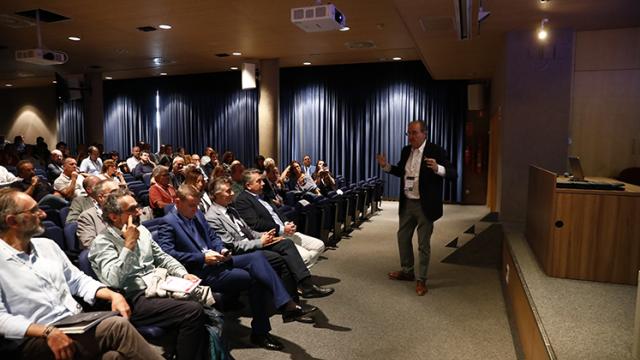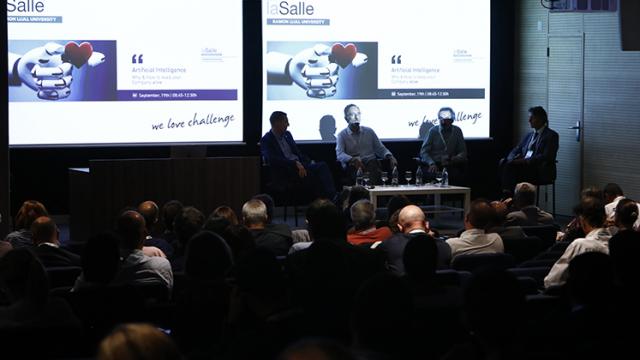“Artificial Intelligence is now here and is already delivering results... But is business ready for AI? And is AI ready to be applied to business?” Xavier Vilasis, Director of the Master's in Data Science and Vice-Dean of the La Salle-URL Doctoral School, raised this question at the Executive Event “IA: Artificial Intelligence. Why & How to keep your Company Alive’, which was held on the La Salle-URL campus on 19 September. At the event, we learnt about some of the uses already being given to Artificial Intelligence (and related disciplines such as Big Data and Machine Learning) in the field of business, the systems used to implement it and a wealth of experiences and problems that have been encountered.
APPLYING AI TO BUSINESS
“There are four very important initiatives that we are implementing”, explains Carlos Ciria, CIO of Penguin Random House Spain & Latam, “and they are very focused on business and improving how we offer our products to consumers”. The first is ‘Z1’, a system that predicts the optimal print run and whether it will be necessary to reprint a book a year ahead of time by creating sales forecasts. The second, ‘Simile’, allows you to generate book recommendations for customers based on the books they’ve already purchased. The third, using data from Amazon, is generating profiles that allow us to better know our customers, how they're finding out products and improving our presence on that marketplace. Finally, we’re deploying a system that adjusts the prices of ebooks depending on the time and country where they are marketed in Spain and Latin America.
Mar Muñoz, CEO of It Travel Services, explained how they use AI systems to build loyalty among hotel and catering customers by creating profiles according to their needs and preferences. Knowing their habits and preferences allows them to have the necessary resources available at the right times to offer the services they want. “Do I know that I have German clients who come to my hotel the third week of August? With that information I can make sure that I have staff who speak German for those dates, I can adapt my recruitment policy... It allows me to adapt to, and anticipate, the actual demand I’ll have”.
Neurite is an start-up that was accelerated at the La Salle Technova Innovation hub that offers companies data analysis services using artificial intelligence. Its CEO, Francisco Batlle, explains how companies that are not like Google or Facebook, and don't have huge amounts of data to analyse, can also take advantage of AI analysis. They thicken data, enlarging it and giving it depth with numerical models, making automated processes that are constantly updated to adapt to changes.
The event was also attended by Daniel Marco, Director General of Innovation and the Digital Economy from the Department of Digital Policies and Public Administration of the Catalan Government, who laid out the administration’s commitment to creating a powerful technological eco-system, with solid infrastructure at the service of the public. In the specific field of AI, the Catalan Government’s commitment has led to the integration of the fields and agents involved (researchers, companies, ethics and legality, citizen participation, etc.) to help implement AI in the Catalan productive sector, always with a focus on the common good as the ultimate objective.
KEYS: DATA AND THE HUMAN FACTOR
Experts have agreed that proper management of data is one of the most fundamental elements when using AI in companies.
“80% of the project is building a correct dataset in order to be able to apply the AI method to it. If the dataset is bad, the conclusion will be unreliable and the decision we makes will be bad.
“If you don't have the data right and you start applying Artificial Intelligence strategies, you’re starting the house from the roof,· added Ciria. “The foundation for everything is the data structure to be able to put together a predictive AI model. You shouldn't be afraid to spend time getting the databases right to make sure they're well structured and the data is what we're really looking for.
Creating a good system does not just allow AI to assist in decision making. Through automation of routine processes, work time is freed up meaning people can dedicate more time to reflection and decision making.
Beyond the specific uses, one of the main conclusions has been that implementation of these technologies is not a magic formula, “we shouldn’t portray this as a magic wand that can solve any problem you wave it at”, explains Vicens Gaitan, Chief Data Scientist of the AIA Group, and it’s not as easy as pressing a button to launch Artificial Intelligence that begins to take care of the company by itself. “Artificial Intelligence is just another, very powerful, tool, but beware,” says Batlle, “it's so powerful that people can get the impression they can just leave it to do its thing. In most cases it's just a tool, you need to integrate it into the organisation and the leadership needs to come from above, so the first thing is to convince the higher-ups”. “One of the mistakes we made six years ago,” explains Pier Paolo Rossi, Advanced Customer Marketing & Analytics Director at Banc Sabadell, “was to install a Big Data team that was completely isolated from the business area. We didn’t get any results until we put them together and could start asking the data the right questions”.
It is essential that people with business knowledge understand what AI is and its possible uses, but”, says Xavier Marcet, innovation expert and president of the Barcelona Drucker Society, “not so much the technical aspect: the most important thing is not that they know exactly what machine learning is or how general AI works, but what effects it can have, how it alters the value chain and what it brings to customers”. And, once you have done that, you should take advantage of the knowledge about the business that the people who are part of the organisation have, “to understand it alongside the real functioning of the company” and to “be able to ask the right questions”.
“When taking on an artificial intelligence project, the first thing we have to do is to be smart with the questions we ask of the data... And the business intelligence is found in the business department, rather than in the mathematical or technical departments who will be dealing with the algorithm”, says Muñoz.
Each company should identify the aspects of its operations where AI can be a useful resource. “It's a toolbox”, says Marcet, “like when I get in the car and put the GPS on: I make decisions differently. Imagine if for the various important issues our company faces we had an assistant that helps us to make better quality decisions”.




